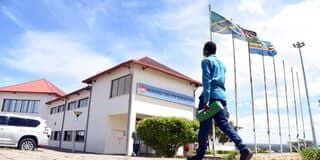
Our Projects are
Transforming African Trade
Quick Contacts
2nd Floor, Fidelity Insurance Centre Waiyaki Way, Westlands

The real gains from any socioeconomic initiative are as good as the benefits they convey to the targeted beneficiaries.
The same applies to the East African Community (EAC). Thus the leadership of the regional bloc owes its collective citizenry the duty of making known why it is potentially beneficial to them.
The idea behind regional blocs—or regionalism, as those more inclined to scholarly exploits like calling it—is premised on a number of imperatives.
Foremost among them are relative geographic proximity and shared cultural, economic and political objectives. The confluence of shared interests is a key rationale of the geopolitical ‘camaraderie’ that anchors the justification of regional blocs.
Beyond shared interests and resources, the member states owe their citizens a range of dividends extractable from trade opportunities possible in the exchange of goods and services in the region. So what should be prioritised to maximise the benefits of the EAC?
Four quickly come to mind. The first two are improving the environment for cross-border trade to thrive and boosting key infrastructure, particularly transport and ICT. The others involve taking a common view on matters macroeconomic for the region and sharing resources to enhance security and the whole slew of cross-cutting social services.
An enabling environment has already been created for the free exchange of goods and services in the EAC to flourish. However, a lot more needs to be done to increase the movement of people, goods and services within the region.
The 300 million-strong combined population is an asset we ought to reimagine and reawaken. Even then, it is necessary to nudge our people to be more adventurous in not just seeking but also creating opportunities in the region. We need to get as many EAC cross-border goods and services providers to venture into the various jurisdictions and invigorate inter-member state trade.
Improved transport and ICT penetration are enablers that hold the key to expanded opportunities for EAC residents. As the member states plan their road and IT infrastructure, we should always have it at the back of our mind that we are actually widening the scope of engagement for our people.
Clearly, we need to prioritise the improvement of accessibility of movement and information in a strategic manner that will, in turn, enable more people within EAC to interact and forge long-term and mutually beneficial partnerships. Joint action in this area is critical.
Concerning the macroeconomics of the region to broaden the range of mutual benefits, we should studiously map our resources, endowments and cycles of agricultural production so that we grow our exchange programme for goods and services in the region. Our needs and aspirations are fairly much the same. And so are the solutions to them.
In this nexus of aspirations and interventions lies a great opportunity to build a booming regional economy, where the axis of demand and supply becomes a stimulus for joint action for the common good.
There is a reason for the establishment of centres of excellence in each EAC jurisdiction to avoid duplication and draw greater surrender value from specialisation in the production of goods and service delivery.
The strictly non-economic boon that accrues when a regional bloc takes the cue for action on conjoint interventions on issues of mutual interest and benefit are many but oftentimes hardly fully appreciated.
For instance, when the residents of a bloc create a mutually beneficial atmosphere, there is goodwill that develops as a result that automatically boosts the prospects of peaceful coexistence.
This has a direct bearing on shared security concerns. Such goodwill also becomes the bedrock of more profitable synergies in a wide range of social services that the people of the EAC can and should enjoy.
As we make policies at the high table to prosper the EAC agenda, we should keep in mind that the trickle-down of tangible dividends to our combined population is the real taste of the pudding.
Read original article
Disclaimer: The views and opinions expressed in this article are those of the authors and do not necessarily reflect the official policy or position of TradeMark Africa.